Whose Technology?
winter 2023/24, Berlin University of the Arts
Technologies are ubiquitous, not at least in the everyday life of artists and designers. They serve as tools for communication, creation, visualization or for assessment, control, and automation. Some technologies operate in close proximity to human bodies, some appear as bodies or creatures in themselves. Some require huge amounts of energy and resources, some have less material impact on our planet. Some are visible, tangible objects, some only become apparent when they fail.
What is technology?, answering this question requires to consider different concepts that have emerged around that term over time and in different regions. The seminar will gather such answers from the fields of the philosophy of technology, media theory, queerfeminist as well as postcolonial theories. Through readings and the study of artworks the seminar aims to take one step back and interrogate the technologies that we engage with in our everyday life and in our artistic practices: Is technology merely a tool, or does it come with a logic that affects what we aim to do with it? And whose technology, or understanding of technology are we engaging with? Turning the word “technology” as well as technologies into strange things, we approach technology not as a neutral entity, but as a product of histories, hierarchies and errants as well as of the desires and interests that emerge from our relation with technologies.
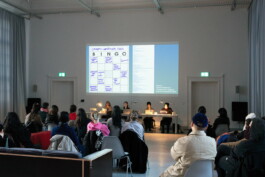
Closing event of the seminar with (Asian) Feminist Studio for Art and Practice, February 2024. Photo: Niklas Thran
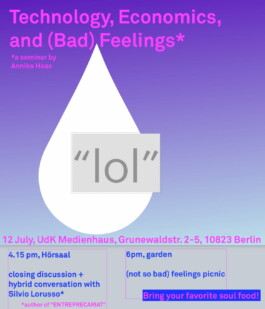
Closing conversation of the seminar with Silvio Lorusso, July 2023.
Technology, Economics, and (Bad) Feelings
summer 2023, Berlin University of the Arts
Digital technologies have an increasing impact on our everyday lives. This includes how they shape our artistic and design practices and how we perceive of the labour connected to that. While a lot of attention goes to so-called technological progress, along with narratives that frame digitization as a success story that is beneficial for all, this seminar asks why using digital platforms, communication tools and underlying infrastructures are not just facilitating what we do and wish for, but also tend to increase already existing precarious working conditions, cause stress, make us sad, or even sick.
Departing from specific affects, feelings and states of being – such as digital fatigue, exhaustion, “digital lethargy” (Tung-Hui Hu), or being “technoprecarious” (Precarity Lab) – we will examine why and how digital platforms, tools, infrastructures, and applications are not neutral, but part of (imbalanced) power relations. Special attention will be given to economical aspects, and the ways that so-called digital economies affect the very reality of different communities, bodies and ecologies, and not at least the way we work.
My Body, My Data, My Choice?
winter 2022/23, Berlin University of the Arts
Human bodies have always been data bodies. Apps and sensors measuring, recording and analysing steps, menstrual cycles, dating activities, purchasing behaviour and sleep are only current examples of the datafication of bodies and lives. The seminar is dedicated to present and historical techniques of body-based data collection, production and processing and the question: Is our data body at our disposal? My Body, My Data, My Choice?
Historical, technological, economic and (bio)political structures in which we exist as data bodies will be analysed. The subversive potential of data bodies will be explored on the basis of theoretical texts, activist projects and artistic works. Which practices of resistance and self-protection become necessary on the one hand, and which new modes of existence beyond gender, race and class become conceivable and tangible as a self-curated data body on the other?
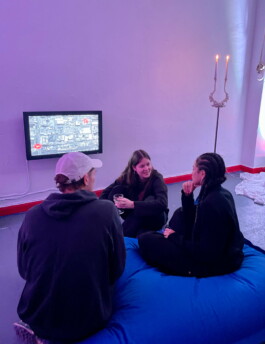
Exhibition Our Data Bodies, together with students from the seminar, and co-curated with Petja Ivanova. Halfsister Berlin / transmediale Vorspiel festival, January 2023.
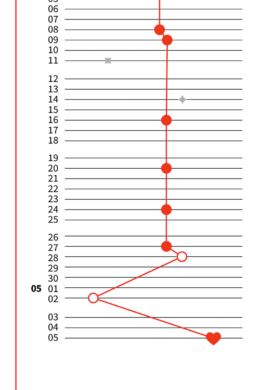
How Long Does It Take To Fall in Love?, data disualization by Annick Rietz, investigating online dating dynamics through information design in my seminar. Image: Annick Rietz.
Love and Technology
summer 2022, Berlin University of the Arts
In 2022, Tinder has been around for ten years. Even though these and other dating platforms are ubiquitous, they are not the first technologies to help shape ideas of love and be used to get to know people and initiate relationships. Letters, the telephone and chat rooms were and are also media for making contact, confessing or distancing and separating. So-called 'romantic' movies and novels have shaped what and who appears desirable, and which forms of relationships find broad social acceptance. The seminar examines various current and historical technologies, cultural techniques and media of love, which itself is a concept in flux. The discussion will focus on the interactions between concepts of love, forms of relationships and technologies as well as the economies, (body) politics and discourses in which all of these are embedded.
WRITING X BODY X PERFORMANCE
winter 2021/22, Berlin University of the Arts
When writing, a unique interplay between human body and text begins. The reasons therefore are manifold: No two bodies are the same. And, writing is a cultural technique: systematics of signs, codes of meaning, techniques, media and also ways of writing are constantly changing. In this seminar, we will look at various theories on the performativity of the body and writing and how they interact with each other. Using examples from art, literature and graphic design, we will analyze how bodies are inscribed in texts by means of language, typeface or layout and which aesthetic and political questions are linked to this.
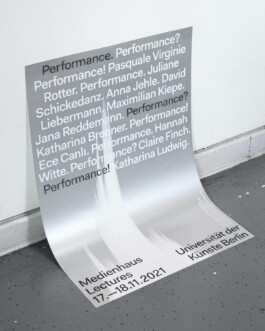
The Medienhaus Lectures 2021, that I co-organized with Henrike Uthe, were part of the seminar. Poster: Lea Verholen and Jonas Gerber.
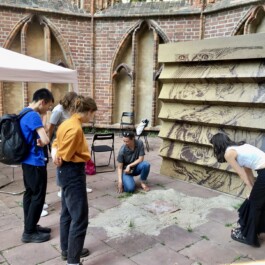
Visiting Anna Szaflarski's exhibition at Klosterruine gallery Berlin with the seminar in June 2021.
Archeology of the Self
summer 2021, Berlin University of the Arts
"The present arises from all its pasts, which are not complete," reads the blog Geschichte der Gegenwart. The past structures the present and therefore also ourselves. Who I am and how I look at and approach things has something to do not only with "my" history, but also with the narrative that my history is part of. For example, when it comes to generation, migration, role models, political upheaval, upward mobility, local contexts, cultural heritage, the experience of flight, the pandemic, and many more aspects.
Linguistic, aesthetic and social norms also show how we have always been entangled with what seems to be "historical," but which we are not always aware of. Perhaps we live in a buried present. The seminar happens in collaboration with the exhibition series Times in Ruins in the Klosterruine gallery, Berlin. The seminar's focus is on theories of history, archaeology and writing as a practice of subjectivation; the study of various media forms that contribute to the transmission and production of history; as well as artistic archaeologies, speculations and counter-narratives. Visits to exhibitions and discussions in the monastery ruins (Klosterruine gallery), together with the testing of various strategies of writing history(s), complement the seminar program.
R.S.V.P. A Seminar in Epistolary Form
winter 2020/21, Berlin University of the Arts
R.S.V.P. This formula is often found at the end of invitations: Répondez s'il vous plaît. Please respond. But even without this addition, the wish to receive a reply is always part of a letter. It is a special form of addressing others, who are not present and makes it possible to get in touch with each other at different times and places. This special communication structure has contributed to the letter becoming a unique format of intellectual and aesthetic exchange in both theory and art. Correspondence is an important part of the estates of numerous philosophers, writers and artists. Letters are also a means of political communication and can be "open letters," addressed to many or used to disseminate information anonymously.
The seminar attempts to think in correspondence: with each other, but in isolation; in absence, but still connected; addressed to others, and yet never detached from one's own desire for exchange with them.
The seminar begins with your inscription by a sending a letter, and takes place in the exchange of letters throughout the winter term.
Radio report on the seminar (in German)
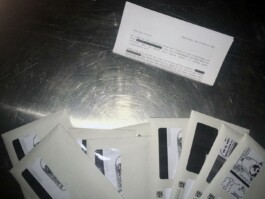
Every other week I wound send out a seminar letter to the 40 participating students, who were also writing letters among each other.
Post Ego: Situated and Intersectional Practices After 'The Death of the Author'
summer 2020, Berlin University of the Arts
The question of the self is a complicated and often political one. What "concerns me" cannot be kept out of theoretical as well as artistic and creative work. The seminar is dedicated to situated and intersectional modes of writing after the "death of the author" (Roland Barthes 1968). Based on this, a second step will ask what role the "I" plays in the seminar participants’ design and artistic practice.
Back to Top